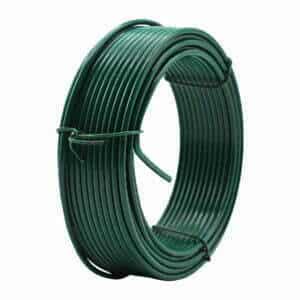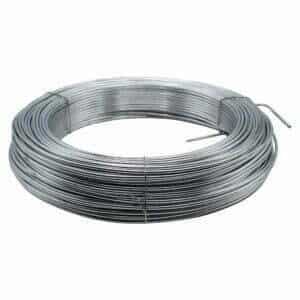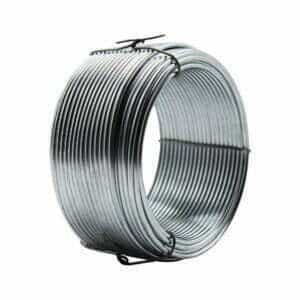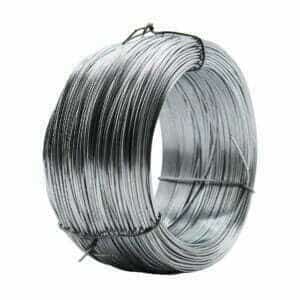







£11.49 inc VAT


This website is secured:
✔ The UK’s Largest Range Of Mesh Products
✔ FREE UK Delivery Included
✔ Immediate Express Dispatch From Stock
✔ Tracked Delivery with Order Updates
✔ 30-Day Returns Accepted
@ ☏ Trade Prices For Larger Quantities Available
The 1.6mm galvanised tension line wire, made of sturdy galvanised steel, is versatile for construction and agricultural needs. Often used in tension-based structures like fences, it offers dependable support for high-stress tasks. It’s also an excellent choice for reinforcing chicken wire mesh in poultry enclosures, ensuring chickens’ safety while letting them roam. This wire pairs perfectly with our green-coated chicken wire and mesh rolls. Highlighted specs include a 1.6mm thickness, 500g coil weight, and an approximate length of 30 meters or 100 feet.
1.6mm galvanised line wire is a strong and durable product that has many uses in the construction and farming industries. Commonly used to create tension structures such as fences, line wire provides reliable support for even the most demanding and high stress applications. It can also be used to support chicken wire mesh around chicken yards and pens, giving chickens protection from predators while also allowing them to roam freely outdoors. This makes line wire an ideal option for farmers looking for a quality product that will stand up to harsh environmental conditions and keep their livestock safe.
The ideal wire to compliment our green coated chicken wire and wire fencing mesh rolls.
Quick details:
Our group have been in the mesh industry for over 150 years. We are one of the UK’s most trusted mesh suppliers because:
The Mesh Company has an enormous range of garden wire mesh products. We truly are an industry leader among suppliers of weld mesh and woven wire materials. With the capabilities we have in-house, we can provide virtually anything you require. Wire fencing, insect meshing and rodent mesh materials are also available in large stock quantities at bargain prices.
Galvanised line wire has been traditionally used for a variety of applications due to its economical and durable qualities. However, there are other line wires on the market that have alternative benefits. Chicken wire mesh is a popular substitute, made from steel which is coated with zinc to prevent oxidation, extending its longevity. It offers strength and flexibility as well as water-resistance, making it ideal for outdoor use. Other options include stainless steel line wire and PVC line wire which offer corrosion-resistant qualities while being lightweight and easy to install.
The tensile strength of galvanised line wire can vary depending on the specific gauge or diameter of the wire, the type of steel used, and the manufacturing process. However, in general, galvanised line wire is designed to have a high tensile strength, which allows it to withstand significant weight or pressure without breaking or losing its shape.
The tensile strength of galvanised line wire is typically measured in pounds or kilograms, and will vary depending on the specific gauge or diameter of the wire. Thicker wires will generally be stronger than thinner wires, and higher-quality steel will typically have greater strength and durability than lower-quality steel.
To calculate how much line wire you will need for a fence, you will need to determine the perimeter of the area you are fencing in, as well as the spacing of your fence posts. Here’s how to do it:
30 metres is equivalent to approximately 98.4 feet.
To convert metres to feet, you can use the following formula:
1 meter = 3.28084 feet
Therefore, to convert a certain number of meters to feet, you can multiply the number of meters by 3.28084. For example:
30 meters x 3.28084 feet/meter = 98.4252 feet
Check out our blog introducing galvanised tension line wire for more information on this product.
We recently published a detailed guide on how to build a chicken coop using chicken wire which will tell you everything that you need to know to be able build your own home for your chickens.
Our goal for our blogs and help guides is to answer as many questions as possible to help to explain the possibilities of mesh to our customers. Contact our team today if you have any questions at all. We are always really keen to help in any way that we can.
We also offer similar products through our highly popular eBay store, check us out there too.
In 2008 Locker Wire Weavers launched The Mesh Company to bring our enormous range of wire mesh products to the general public for the first time. Previously wire mesh was only available for trade customers.
We continue to extend our range, and now proudly offer many forms of mesh and metal products for the best possible prices. We specialise in woven wire mesh. As a group we work closely with architects and designers to develop ground-breaking new applications for our multifunctional range of materials. We also offer state of the art fabrication and engineering for projects of all sizes.
Strong ties with the Warrington community continue to be at the very core of our business. We are proud to invest in the training and developing our staff of all levels in line with the traditions set by Thomas Locker, who founded our group 150 years ago when he invented the electronic loom. We continue to bring ingenuity and strong ethics to our day to day business.
The Mesh Company continues Warrington’s historic role in the wire industry. For more than 140 years, our group has been a leader in the supply and manufacture of woven wire mesh and wire cloth. Having been founded in Warrington, UK in 1878, Locker mesh products still retain the quality craftsmanship and spirit of innovation that were so characteristic then.
Available Options
You will find full rolls of this insect netting here. Please be advised that the majority of woven mesh is usually available in a maximum roll size of 30 metres by 1200mm. Please email us if you wish to discuss purchasing this mesh in any size – sales@themeshcompany.com.
Feel free to call us if you wish to discuss any of our products – (+ 44) 01925 406 602. We are always happy to help in any way that we are able to.
We also offer this product through our highly popular eBay store, check us out there too.




The largest range of wire mesh, chicken wire, wire fencing, woven wire mesh and perforated metal products in Europe, delivered direct from our Warrington warehouse.




Website by: Beech Web Services | Terms and Conditions | Cookie Policy | Privacy Policy | Website Terms and Conditions
Reviews
There are no reviews yet.